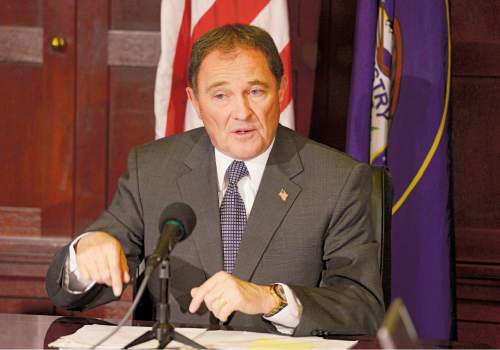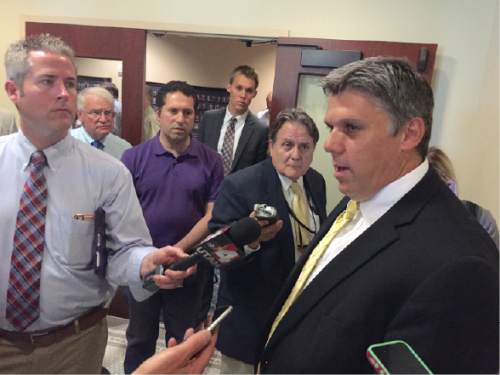This is an archived article that was published on sltrib.com in 2015, and information in the article may be outdated. It is provided only for personal research purposes and may not be reprinted.
A gaping loophole in state election law could enable Gov. Gary Herbert to make good on a pledge to give San Juan County Commissioner Phil Lyman $10,000 toward his legal defense involving his conviction on trespassing on a scenic southern Utah road.
Herbert offered to put $10,000 toward Lyman's defense after the state's Constitutional Defense Council declined to put up $100,000 in taxpayer money for the cause. Lt. Gov. Spencer Cox also said he would donate $1,000 toward it.
Questions were raised about the legality of using money from a campaign account or political action committee for such a purpose, but the lieutenant governor's office, consulting with the attorney general's office, said the donations would likely be legal — technically.
Herbert and Cox can give their campaign funds to Lyman's County Commission campaign account because transfers between campaign accounts are permissible. Lyman then can use the money for pretty much anything he wants, because Utah law doesn't restrict such county-level expenditures the way it does for other candidates.
"If you were a municipal candidate or a state candidate, there are those 'personal use' restrictions. But for a county candidate, they don't have those in statute," said Mark Thomas, director of the state elections office. "In fact, there's just nothing there as far as restrictions on what it could be used for."
The one limitation is that country candidates or officeholders cannot shift money from their campaign accounts into their personal or business bank accounts.
Thomas said the county loophole was brought to the office's attention when a candidate for county office was accused of having bought a new personal vehicle with campaign funds. The county attorney investigated, only to find there was nothing the candidate could be charged with because there was no state law or county ordinance prohibiting the personal use of campaign funds at the county level.
There also may be another, more direct path for Herbert to give the money to Lyman: The commissioner could set up a nonprofit organization and, under state law, Herbert could classify it as a contribution to a charity, which has a sweeping, almost limitless definition in state law.
"We haven't actually made the contribution at this point, but we're trying to examine all the ways to do that to make sure it's done in a legal fashion," said Marty Carpenter, the spokesman for the governor's re-election campaign. "The governor's commitment has been that he wants to help Commissioner Lyman, but do it with funds he's raised, so we're committed to finding a way to do that."
Carpenter said the money would come from Herbert's PAC, which is used to help other political candidates he supports. And the pledge of funds was intended to help Lyman without using taxpayer money.
That said, it is unclear if Lyman will accept Herbert's offer. Lyman hasn't said yet whether he wants the governor's money and the campaign is still waiting for an answer. Lyman refused to comment on the status of the contribution in response to a query from The Salt Lake Tribune
Lyman has been convicted of two misdemeanors for his part in a protest ATV ride through Recapture Canyon in San Juan County, a road that the U.S. Bureau of Land Management declared closed to protect archaeological artifacts.
Lyman faces up to a year in jail and $100,000 in fines, as well as restitution with damage allegedly done to artifacts in the canyon just east of Blanding.
Lyman's supporters argue that U.S. District Judge Robert Shelby should have allowed the defense to present evidence that the BLM's closure of the road was invalid. The governor has asked Utah Attorney General Sean Reyes to investigate the legality of the road closure.
Utah Democratic Party Chairman Peter Corroon said people gave to Herbert's campaign believing the funds would be going to the governor's re-election, not to support other purposes.
"Using the money to defend somebody who has been convicted of a crime is certainly a concern," Corroon said. "Whether it's legal or not, certainly I don't think campaign funds should be used for nonpolitical purposes."
Corroon also said the Legislature needs to close the loophole that could be exploited by county candidates.
"The last thing we need," he said, "is politicians walking away with tens, if not hundreds of thousands of dollars in campaign funds and using them for personal purposes."
Twitter: @RobertGehrke







